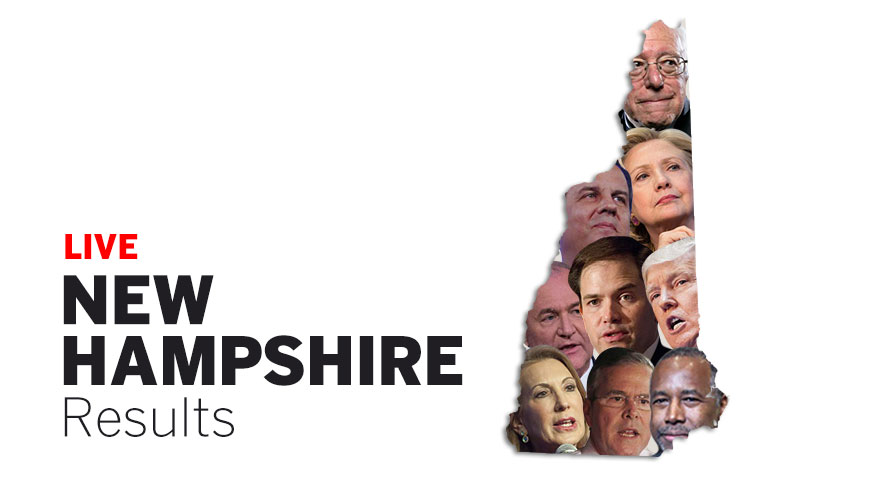Live New Hampshire primary updates: Exit polls bode well for Sanders, Trump
By the numbers
- Live results from the 2016 New Hampshire primary. Polls close at 4 p.m. PT/7 p.m. ET
- Keep an eye on these towns for clues in the New Hampshire vote
- New Hampshire Secretary of State Bill Gardner predicts a record turnout
- In tough New Hampshire fight, voters see two sides of Hillary Clinton
Live results from the 2016 New Hampshire primary
The second stop on the 2016 campaign trail is New Hampshire, where voters are now casting ballots in more than 200 towns across the state. Some rural areas have already reported returns, but most results are not expected until after polls close at 4 p.m. Pacific.
Check here for the latest results.
Keeping the polls open late
With what's sounding like strong turnout across New Hampshire, at least one large polling location is staying open later.
Most polls close in five minutes, but because of traffic issues, officials are considering keeping Merrimack's polling place open until 8 p.m. EST.
It is the state's largest polling location in terms of registered voters for a single town, according to the New Hampshire Secretary of State.
And here's a look at some of the state's old-fashioned voting traditions.
Big night ahead: A moment of quiet before Marco Rubio's event in New Hampshire
Exit polls: Two-thirds of New Hampshire Republicans support ban on Muslims
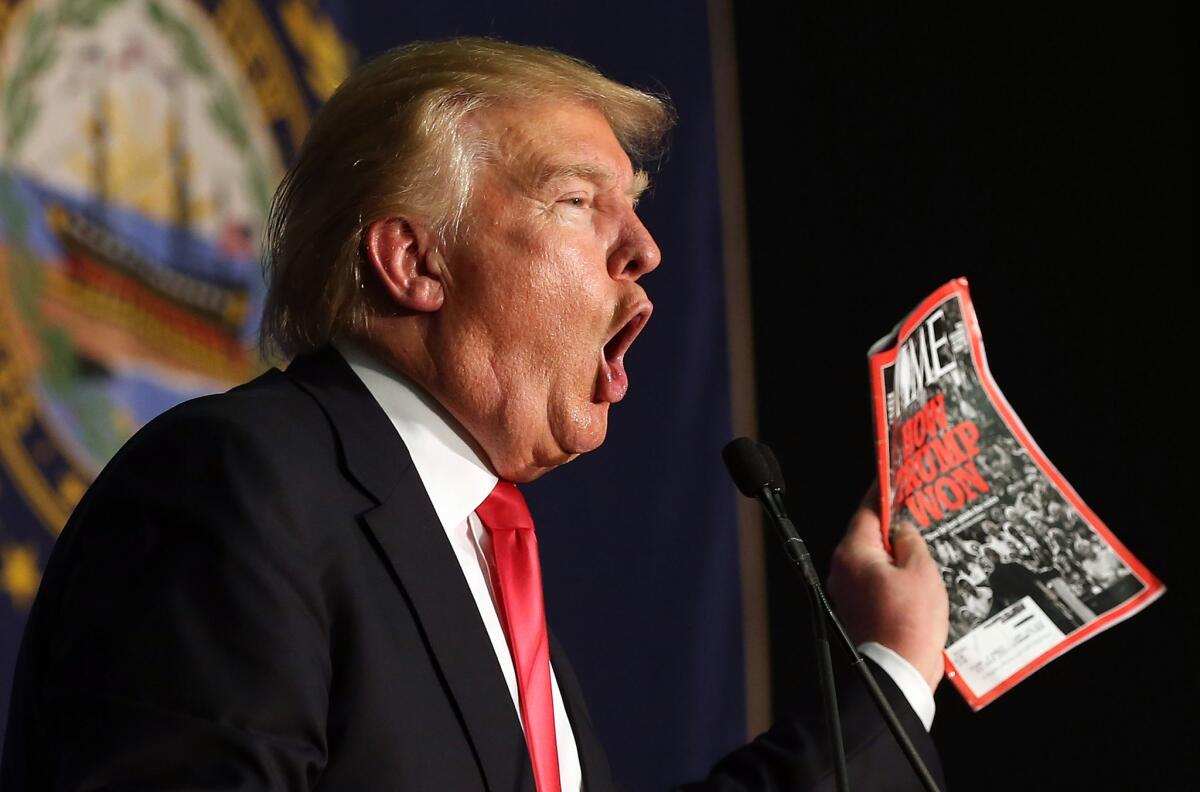
Donald Trump shows off a Time magazine with a cover story titled “How Trump Won” during a campaign event in Iowa on Feb. 2.
A majority of New Hampshire Republicans support a ban on Muslims entering the country.
Based on exit polls released Tuesday, two-thirds of New Hampshire GOP voters favor temporarily banning Muslims who are not U.S. citizens from entering the country.
In December, Donald Trump, the front-runner for the GOP presidential nomination, announced a plan to ban Muslims from entering the country.
The plan -- which was castigated by Democrats and Republicans alike -- came on the heels of terrorist attacks in San Bernardino and Paris by people who had pledged an allegiance to Islamic State terrorists.
Several statewide polls in New Hampshire show Trump with a double-digit lead over his competitors.
Exit polls: Experience, yes; electability, not so much
Exit polls: 9 in 10 GOP voters do not like the federal government
Stepping into the voting booth, and still undecided
It is well known that New Hampshire voters don’t take their role in electing a president lightly. Many faced with the fraught decision, in fact, were still sorting it all out right up until the moment they stepped into the voting booth Tuesday.
“I may just turn around and walk back out,” said September Hoeler, a 58-year-old Republican who was not thrilled with any of her choices. “I may not have the stomach for it.”
A few hundred feet away, Emily Doyle, 36, stood in a long line of undeclared voters waiting to register. She was still trying to decide if she would pull a Republican or Democrat ballot. “I don’t know,” she said. “I am so anti-Trump, I might vote Republican to vote against Trump." Which Democrats would she support? “I can’t decide if I am for Bernie or Hillary,” she said.
Standing behind her on line was Kati Amarantes, 34, who had made up her mind – 15 minutes earlier. The Trump supporter would be voting for Hillary Clinton.
Huh?
“I don’t feel [Trump] will win the [general] election,” she said. “If a Democrat is going to win the election, I want it to be the Democrat I support most. This is a long-term strategy.”
Exit polls: Democrats split on how liberal to make the party
New Hampshire's Democratic voters are split over whether it's more important to continue President Obama's policies or become a more liberal party, according to exit polls conducted for a consortium of media.
According to the poll, 41% prioritized continuity, versus 40% who want a more liberal president. The poll also showed 90% of Democrats said they believed the economic system favors the wealthy.
That could explain Vermont Sen. Bernie Sanders' big lead in the polls conducted there before today's election.
Exit polls: Nearly half of New Hampshire's GOP voters waited until final days to pick a candidate, exit polls show
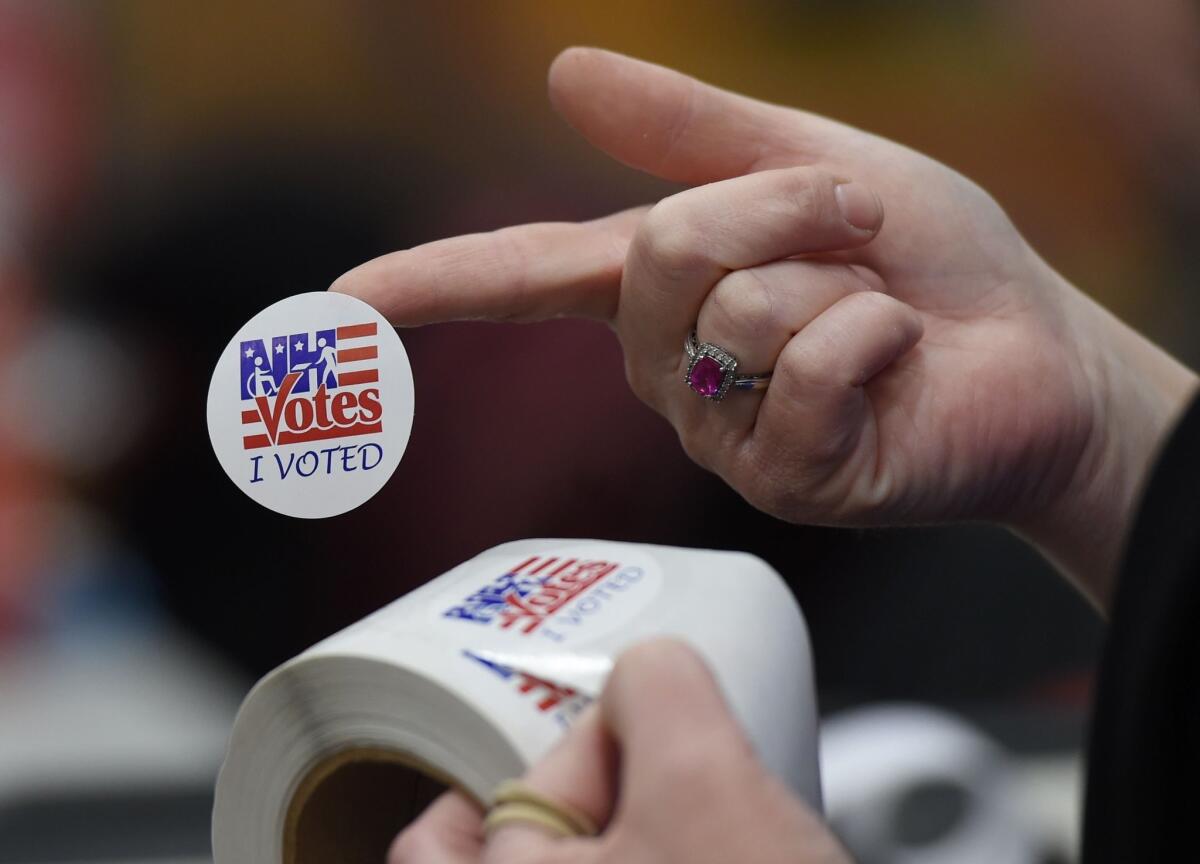
An election worker hands out stickers to voters afer they cast their ballots in Belmont, N.H.
New Hampshire voters are famous for waiting until the last minute to decide which candidate they prefer. And they did not disappoint Tuesday.
Nearly half of Republican voters, 46%, made up their minds in just the past few days, according to exit polls conducted for a consortium of media outlets.
Among Democrats, there was a bit more certainty: Almost one-quarter, or 22%, decided their vote in the final days.
What remains to be seen is whether those last days on the campaign trail changed hearts and minds.
In the week leading up to Tuesday's voting, not only did the candidates flood the Granite State, but both parties held defining debates that may have swayed voter choices. Or not.
Millennial Democrats learn about election from social media more than millennial Republicans
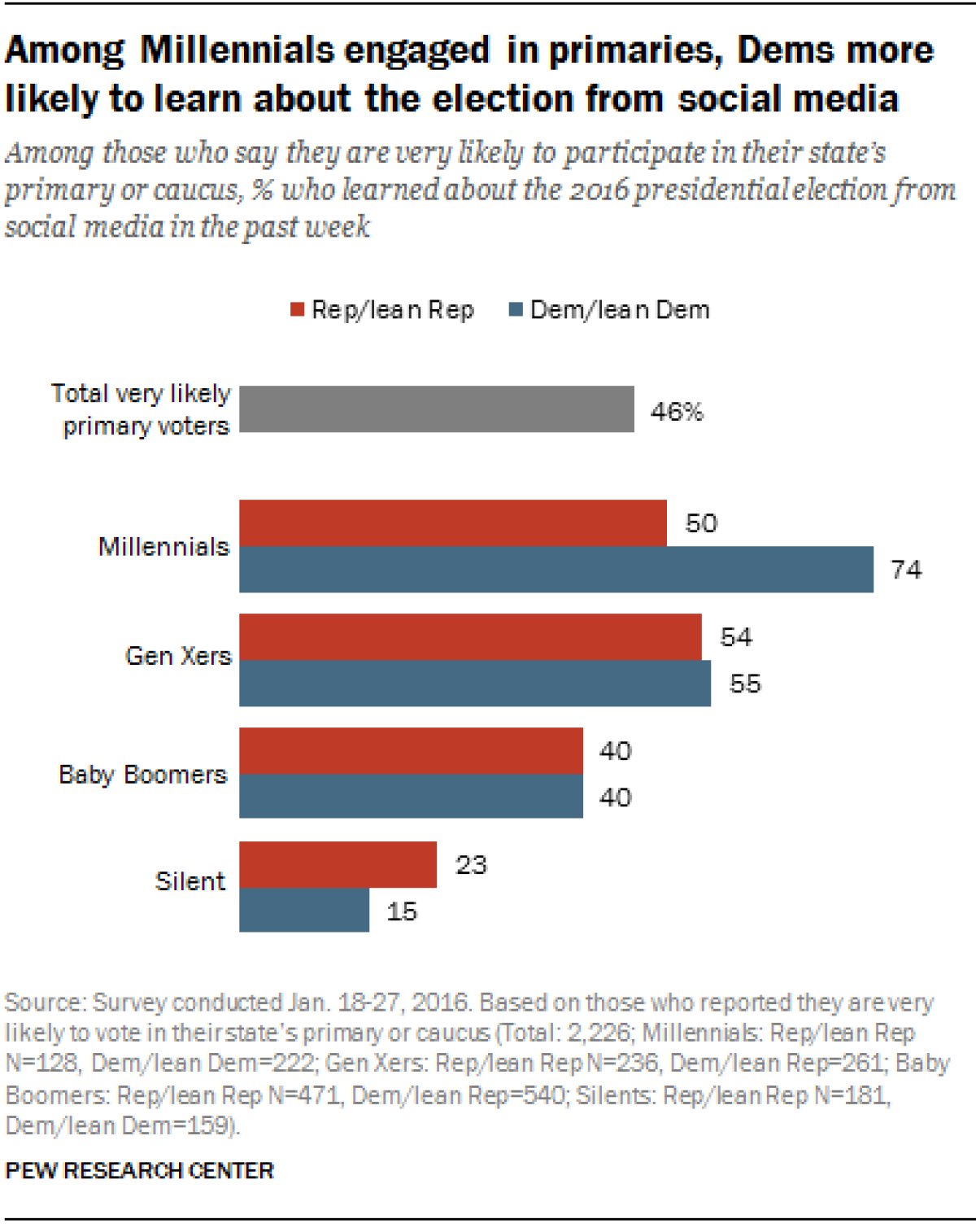
Courtesy of Pew Research Center.
When it comes to election coverage, millennial Democrats are more likely to turn to social media than their Republican counterparts.
Pew Research Center found that 74% of millennial Democrats engaged in the primaries used some form of social media for election updates. Only 50% of Republican millennials did the same.
The finding was not seen among other generations.
Perhaps most striking was the difference in platform use between the parties. About 16% of millennial Democrats use Reddit, compared with 1% of Republican millennials. And 12% of millennial Democrats use Snapchat, versus 5% of Republicans.
Not surprisingly, Facebook reigned supreme for both Republicans and Democrats.
Donald Trump's vulgar remark casts shadow over his New Hampshire campaign
Just as Donald Trump was supposed to be savoring an all-but-sure victory in the New Hampshire primary, a vulgar remark that he made has cast a shadow over his campaign for the Republican presidential nomination.
At both of his stops Tuesday at Manchester polling places, reporters asked the brash Manhattan developer to explain why he’d called rival Ted Cruz a “pussy” at a Monday night rally.
Trump was telling the thousands of spectators in the sports arena what a woman in the crowd had just shouted at him.
As soon as Trump stepped out of his black SUV Tuesday afternoon at Webster Elementary school in Manchester, a TV newswoman told him that many women find the term offensive.
She asked if he had any regrets about using it.
“No, not at all,” he responded. “We had a lot of fun.”
Another reporter confronted Trump outside another school polling place and asked him about uttering what he called “the p word.”
“The place was going wild,” Trump replied before greeting a few dozen chanting supporters, many of them from neighboring Massachusetts.
“You’re so politically correct," Trump said. "And I didn’t say it. This was a repeat of a woman who was screaming it from the audience, right in front. She was screaming it. All I did was repeat, because people said, `What did she say? What did she say?’ I repeated the word.”
In TV interviews earlier, Trump was asked repeatedly whether it was presidential to say such a word in public.
Questions about Trump’s temperament have dogged his candidacy for months. He often swears in public, but he’d been relatively subdued in the days before the New Hampshire vote.
After losing the Iowa caucuses last week, Trump said he would try to be more understated and statesmanlike.
On Tuesday, NBC News anchor Lester Holt asked Trump whether he would say the word in public as president.
“No,” Trump said.
“So are you going to be a different guy as president?” Holt asked.
“Yeah,” Trump responded, adding that he had been a good student, “went to the best school” and came from “a good gene pool” – including an uncle who taught at the Massachusetts Institute of Technology.
“Is this an act?” Holt asked.
“No, it’s not an act,” Trump said. “Last night I had thousands of people. We had a great time, and it wasn’t my word. It was a word that a woman kept shouting.”
“When you’re president, or if you’re about to be president,” Trump said, “you would act differently.”
Meantime, looking farther down the campaign trail...
How much did the debate hurt Marco Rubio?
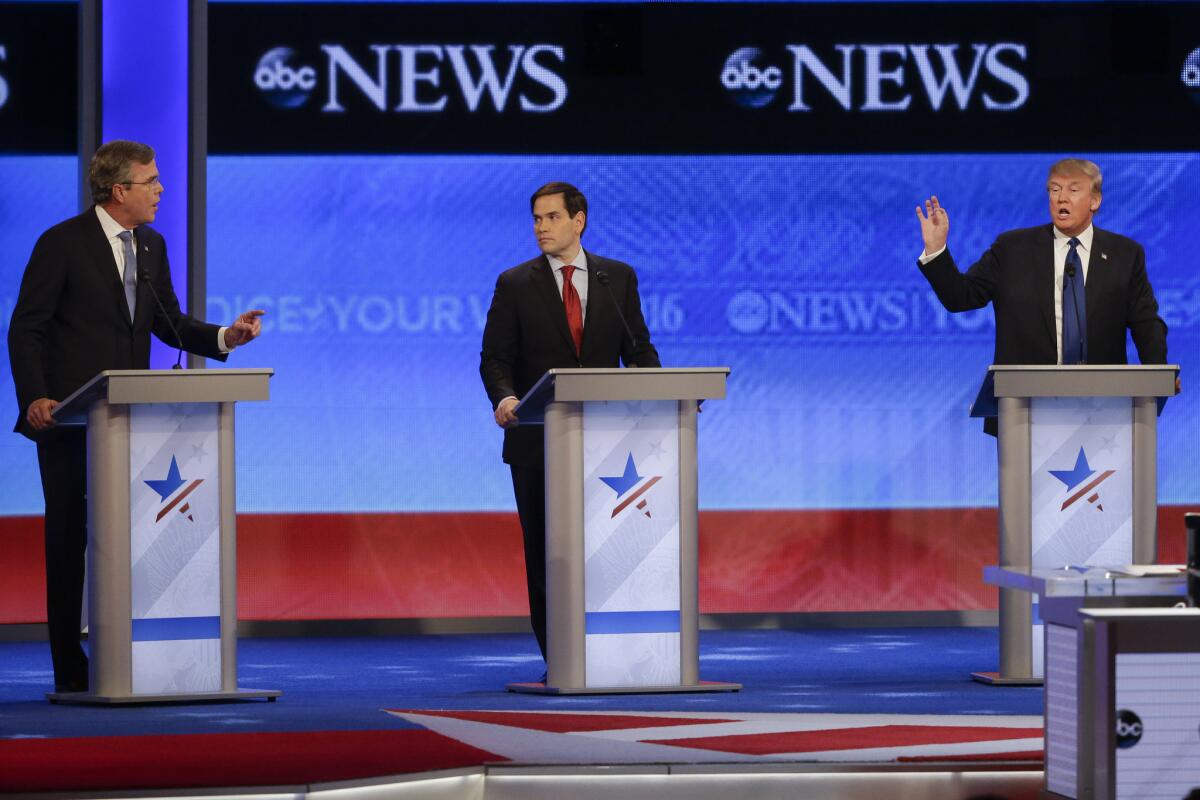
Marco Rubio looks on as Jeb Bush, left, and Donald Trump, right, spar at the debate.
Marco Rubio was riding high after Iowa, where his strong third-place finish in the caucuses left him poised to consolidate mainstream Republican support for his presidential campaign.
But Rubio's unsteady performance in Saturday's debate, where New Jersey Gov. Chris Christie threw him off balance by highlighting his repeated reliance on talking points, which opponents quickly labeled robotic, fed doubts about whether the first-term senator from Florida is ready for the White House.
Now New Hampshire voters have a chance to demonstrate whether the debate was a minor stumble or a major roadblock in Rubio's pursuit of the Republican nomination.
Catch up on our story about the debate to see how the senator's rivals targeted him on Saturday night.
For those keeping track
The myth of the well-informed New Hampshire voter: 'There is a vote Tuesday?'
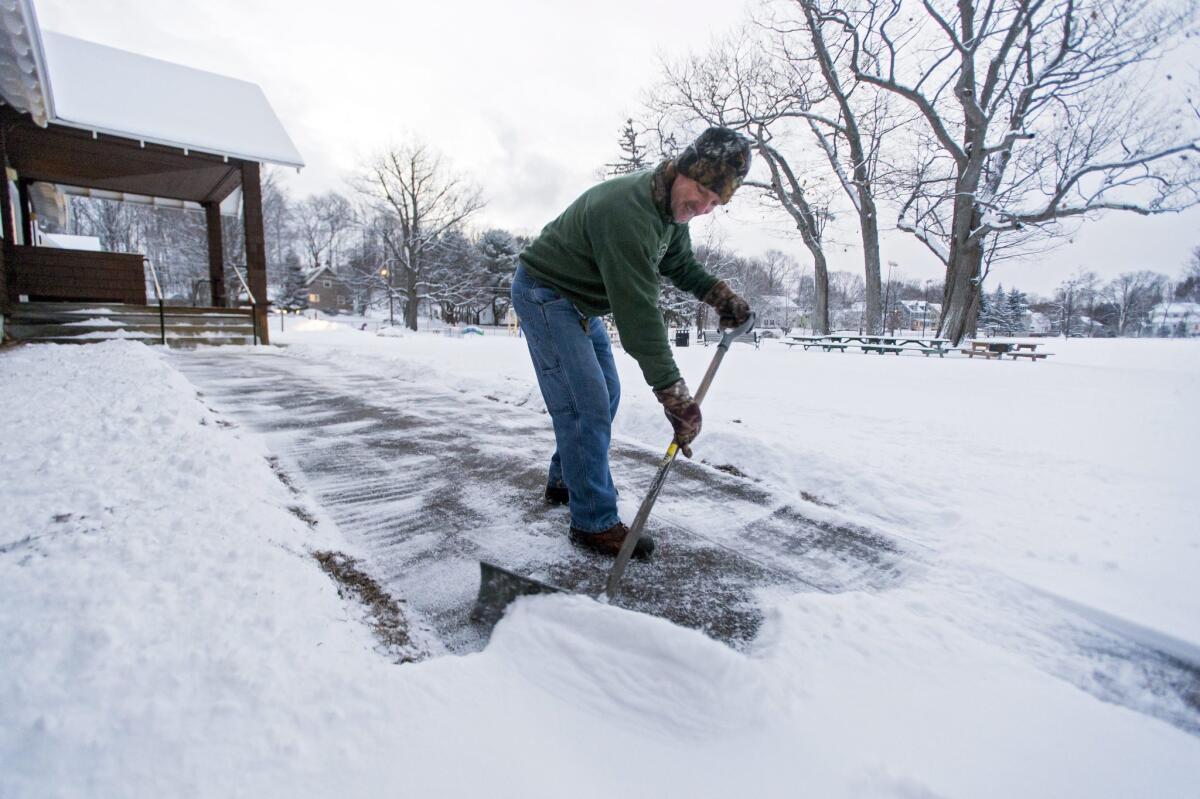
Wayne Peirce shovels snow off the sidewalk at a polling station in preparation for opening in Laconia, N.H.
Every four years, politicians descend on New Hampshire to genuflect to the state’s legendary voters. They tell them how wise, how discerning, how independent, how engaged they are.
While voters in other states are accustomed to receiving a certain level of puffery, the New Hampshire voter is put on a pedestal that would make a Nobel laureate jealous.
Leave it to a pair of locals to blow the whole gig open.
“While there is a kernel of truth to many aspects of this caricature, it is primarily a myth,” write David Moore and Andrew E. Smith, a pair of University of New Hampshire professors who may not be invited to many more faculty teas.
Here's what they found:
Guide to New Hampshire's demographics
Results will roll in throughout the day on our Campaign 2016 page, and our team of reporters on the ground is covering every twist and turn.
Have questions about the primary? Tweet them to @latimespolitics.
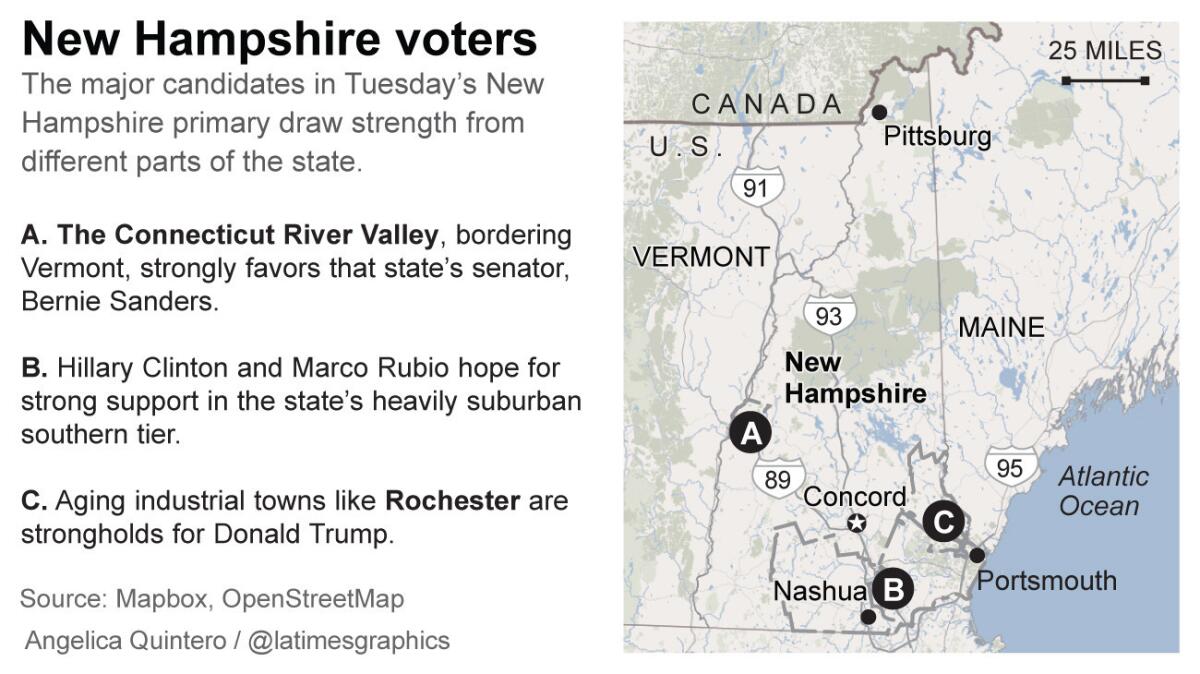
Marco Rubio is pro-snow. The cold, not so much.
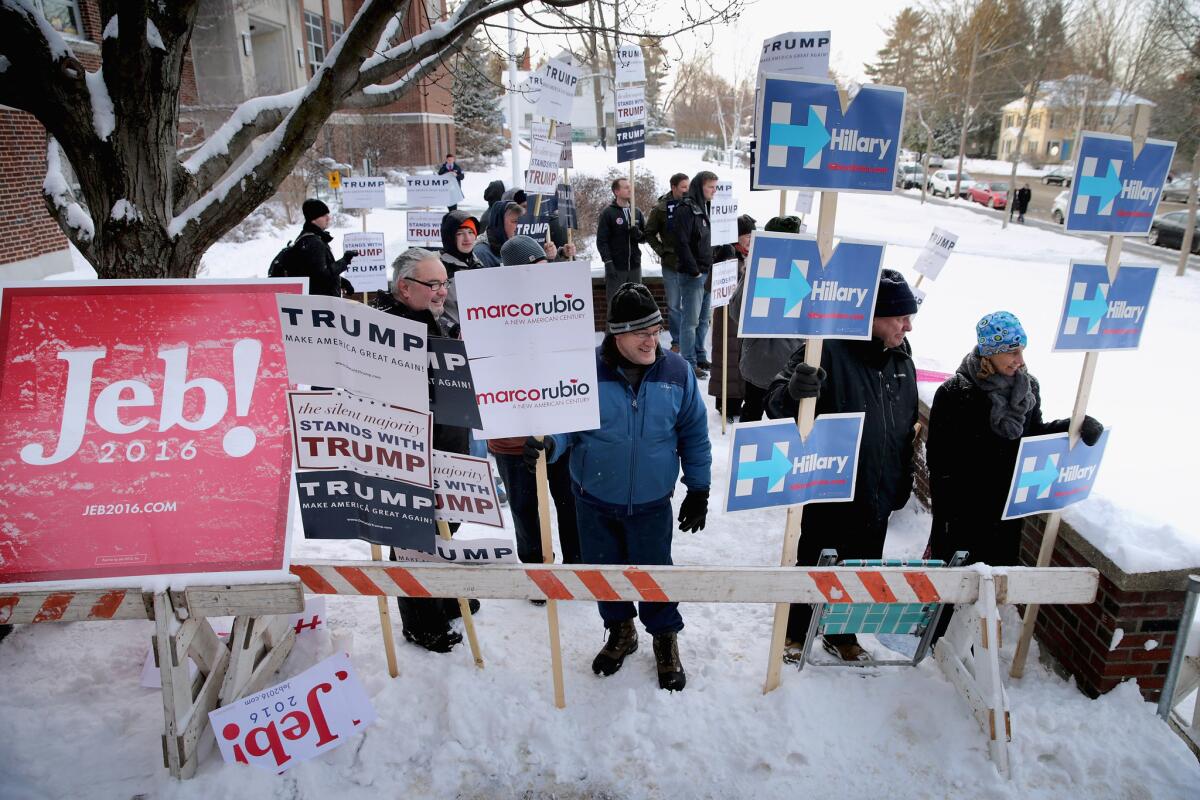
Supporters of various presidential candidates hold signs outside a polling place at the Webster School in Manchester, N.H. Tuesday is the 100th anniversary of the New Hampshire primariy, the “first in the nation’ test for presidential candidates from both parties.
Usually, politicians can't stand the heat. For Marco Rubio, it's the cold.
The Sunshine State senator marveled over and over again at New Hampshire's snowfall Tuesday, and Granite Staters' ability to withstand the chilly temperature.
"That's all you're wearing?" Rubio asked a girl with a thin sweatshirt and no jacket Tuesday morning outside Gilbert Middle School in Derry. "No, you're cold. You know you are."
When a woman was having trouble taking a photo, he blamed it on the weather: "It's so cold, the phone froze."
Later, he tried out snow policy: "We're trying to get rid of the snow," he explained, surprised to learn the flurries were falling from the sky, and not being kicked up by the cars, as he suggested.
Rubio spent a lifetime mostly in Miami, with a childhood detour in Las Vegas, and has little experience with the snowy North. He wore just a blue "Rubio New Hampshire" jacket over his shirt and tie,
"You guys aren’t cold? What’s wrong with you?” he asked voters later outside Windham High School.
When he spotted volunteers from home, he called out: "You guys look nice and warm over here, ready to go back to Florida.“
Even after a long talk with New Hampshire voter Stephanie Tsepas in Derry about cancer research, it all came back to the snow,
"I can tell you guys are from here," he said as Tsepas and her daughter, who had no jacket, posed for a photo.
The daughter was wearing flip-flops earlier, he was told.
"No, you did not!" Rubio said.
Trump, Clinton lead the Facebook conversation in New Hampshire
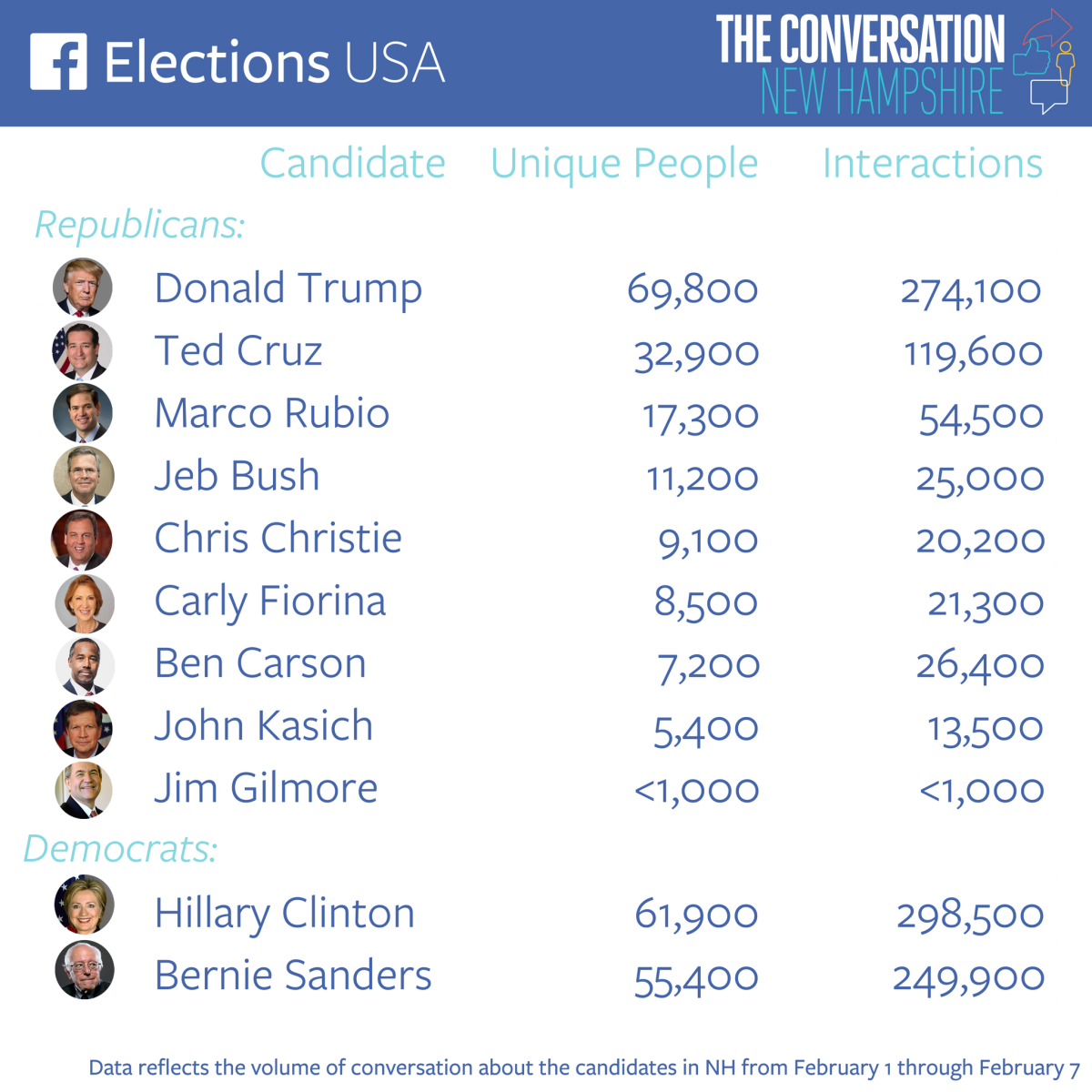
Conversation in New Hampshire. Courtesy of Facebook.
Ahead of the New Hampshire primary, Facebook released data on which candidates were most talked about in the state.
Donald Trump led the conversation on both sides of the aisle. But the amount of discussion around a candidate doesn't necessarily mean that he or she will earn the most votes at the polls. Trump also dominated the Facebook conversation in Iowa ahead of the caucuses. But as we know now, it was Ted Cruz who was declared the Republican winner.
New Hampshire primary polls: The final read
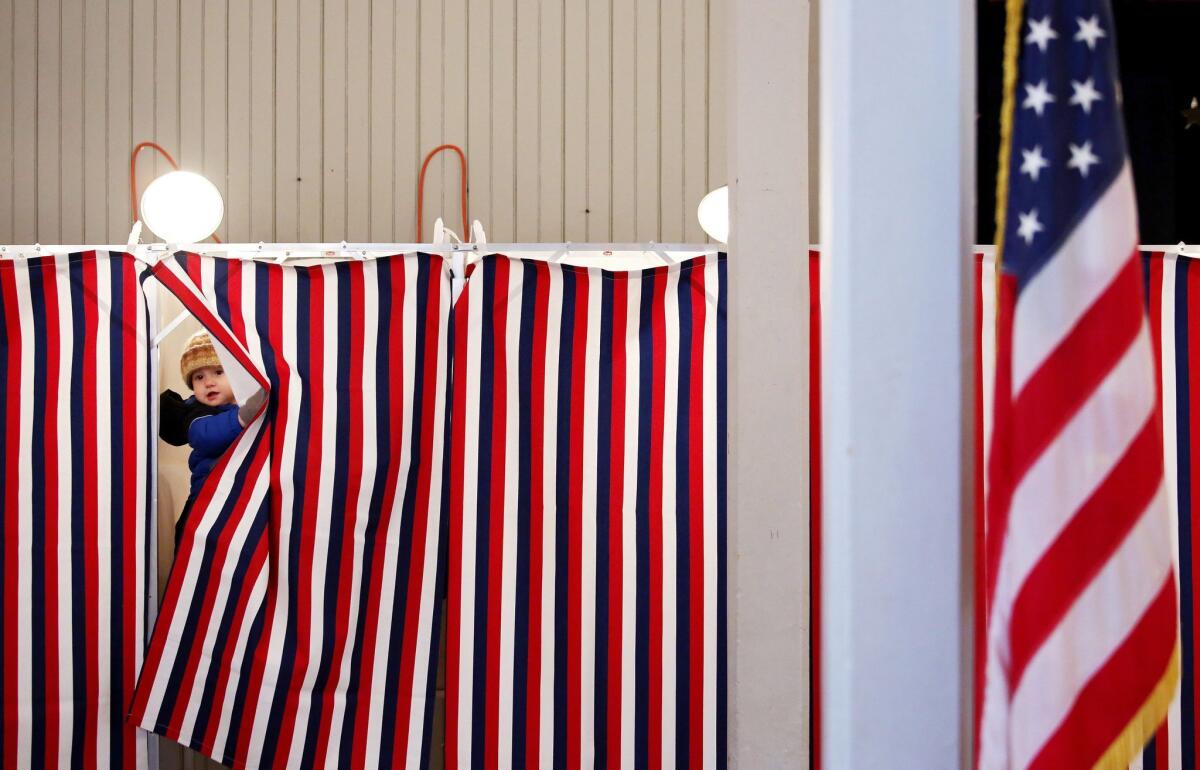
Thirteen-month-old Joseph Chichester peeks out of a voting booth as his father, Luke, casts his ballot in Tuesday’s presidential primary in Greenfield, N.H.
The final round of New Hampshire polls all project that Donald Trump and Sen. Bernie Sanders will win their respective primaries on Tuesday.
After that, it's anybody's guess.
New Hampshire is notorious for confounding pollsters. Here's what they are predicting.
Scenes from a New Hampshire polling place
By the numbers
Get the L.A. Times Politics newsletter
Deeply reported insights into legislation, politics and policy from Sacramento, Washington and beyond. In your inbox three times per week.
You may occasionally receive promotional content from the Los Angeles Times.
